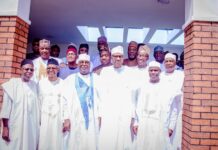Ime Akpan
The Chief Justice of Nigeria (CJN), Mr. Tanko Muhammad has said that the judiciary is not insulated against corruption for it forms part of a larger society.
Muhammad who stated this in Abuja yesterday while answering questions before his confirmation as the substantive CJN by the senate said he was not surprised that some members of the bench were corrupt.
He confessed that the judiciary under his watch has challenges of corrupt judges adding that corrupt people in that arm of government should be treated like all other crooked elements in the society to serve as deterrent.
“Talking about corruption in the society and judiciary in particular, I always say that the Nigerian judiciary is part and parcel of Nigeria. Therefore, I am not surprised if I see some justices that are corrupt. But such judges who are corrupt should be identified and prosecuted under our laws.
“Now the most worrisome of this trend is at the lower ebb of our judiciary. For those of us at the lower court, that is the magistrate. This is where the corruption arises. I was a magistrate. Then we had a white man who was Chief Judge of our state; we inherited him, he will kill any trace of corruption, but unfortunately, it rubbed down on us and this eventually happened in all cases.
“Corruption is in-built in the person who wants to be corrupted because if there is no corruption, there shall be no person who will be corrupted. Left to me, the corrupt judges should face same music as other Nigerians,” he said.
To insulate the judiciary from corruption, he called for its financial autonomy.
He said as much as the judiciary would want to clean up the society; it was bogged down by lack of financial autonomy.
The CJN also said some state governors are a hindrance the independence of state judiciary.
“We are not asking for anything more than what is provided in the budget but believe me, if you go to some states some governors deny monthly allocations to the judiciary while they take care of their political appointees.
“They (judiciary) have houses, offices to maintain, and where they are collecting revenue they are not supposed to dip their hands into the revenue because their revenue must go back to the state.
“It is in my view that it’s only the legislature that can put things right in Nigeria,’’ he said.
Continuing on the issue of corruption, Muhammad contended that corruption thrives in the country because of the slap-on-the-wrist punishment of offenders.
Due to light sentences for criminals and corrupt individuals, Muhammad said some of such people would rather always prefer to go to prison and spend a few years.
“Left to me, there is a need to look at our criminal laws again, with a view to dealing with corruption in the society.
“Some criminals are couching on loopholes in our laws and I want to urge the legislators to amend laws to sanitize the society. In the 50s and 60s, up to 1975, you can open your door and sleep with your eyes closed,” he said.
He urged the legislature to sanitize the society with a holistic review of Nigerian laws, and promised to project the judiciary and draw attention to the many challenges confronting it without going begging for it.
“I am charging the legislature, both in state and federal levels, to take a holistic look at our criminal laws. Let us amend them; let them take care of all the lapses in our laws. Let us provide adequately so that it will serve as guide to these anomalies. It is the duty of the legislature to sensitise the society.
“Much as the judiciary would like to work, but what is given to us is limited by law. But I believe the legislature at both federal and state levels have every power to legislate or to amend the existing legislations in this country,” he said.
Commenting on technical judgments delivered in the past by the Supreme Court, the CJN defended the verdicts, saying such judgments were subject to double interpretations.
“If something is technical, it is in a way giving a leeway for double interpretations. It may be interpreted one way by Mr. A or it may be interpreted the other way by Mr. B.
“If something technical comes before the court, what we normally do is the trial court will ask people who are experts in that field to come and testify. We rely on their testimony because they are experts in that field.
“Ask me anything on aero plane, I don’t know; ask me to fly an airplane, I am sure if they told you that that flight is going to be piloted by Tanko, I am sure you will jump out of the plane. Because it is something that is limited to technicality, my technicality is in law.
“Therefore, it is something that has to do with the perception of the way you think you can achieve the goals for what you want to achieve. Several of our laws are dependent on technicality. But remember when we come we have what is known as rules of interpretation. We resort to rules of interpretation. There are several rules of interpretation. It is through that we resolve the problem that is technically raised.
“We have technicalities in our laws and this is because these laws that we have inherited from the British, the British had for sometimes ago introduced what is known as technicalities in their laws,” said Muhammad.




























































